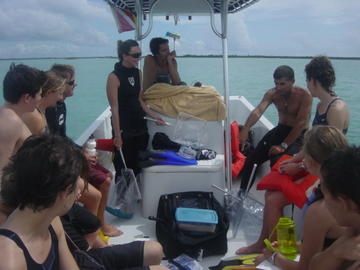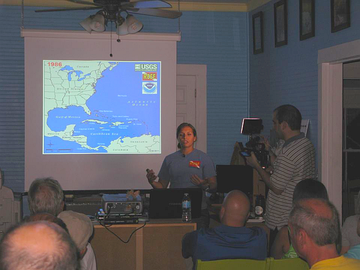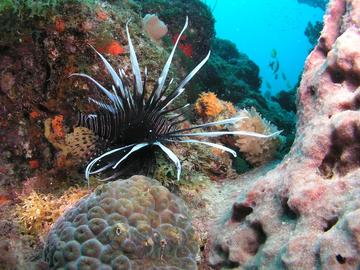Following the most recent Indo-Pacific Lionfish expedition at Stuart Cove’s in Nassau, Bahamas, we kicked off the next phase of our critical research on this invasive species in Eleuthera. Supporters, Trish and David Ferguson, served as hosts for the week. Earlier this summer, REEF staff set up 11 study sites, tagging 30 fish on six different patch reef and clearing the other 5 sites of lionfish. This past week, I revisited those tagging sites and documented any movement of lionfish.
Information on fish movement and growth is primarily obtained through the marking and tracking of individuals with external tags, which are usually affixed to anesthetized individuals at the surface. However, the quantity and quality of data obtained by this method is often limited by small sample sizes owing to the time associated with the tagging process, high rates of tagging-related mortality, and displacement of tagged individuals from the initial capture location.
$2,620 per person double occupancy. Includes: lodging for 7 nights onboard the Aqua Cat luxury liveaboard in an ocean view cabin, all meals and drinks, up to 5 dives per day for 6 days and 2 dives on the last day of diving, and r/t ground transportation from Nassau Airport.
+$200 REEF Program Fee per diver will be added to each package to cover the cost of the group leader, seminar and survey materials.
This popular trip returns in 2012 for the third year in a row. Reserve your space now, it will fill up quick.
$1995 - $2195 per person (depending on cabin type, double occupancy. Includes seven nights on board the Sun Dancer II, all meals and beverages (including well brands of alcohol and Belikin beer), transfers from/to Belize International Airport, five and ½ days of diving up to five dives per day, other standard Dancer Fleet services and amenities.
Funded by a grant through the US Fish and Wildlife Service, REEF’s Lionfish Program Coordinator, Elizabeth Underwood, will travel to cities throughout the Southeast United States to conduct a series of lionfish collecting and handling workshops. These workshops are meant to educate and engage stakeholders (recreational divers, professional divers, environmental groups, students, general public, etc.).
Frequent culling of the invasive Indo-Pacific Lionfish throughout the Caribbean has been shown to cause a shift towards more wary and reclusive behaviour by lionfish, which has prompted calls for halting culls. This paper, co-authored by REEF Lionfish Program researchers, addresses those concerns and reviews research conducted by REEF and other research efforts. Culling successfully lowers lionfish numbers and has been shown to stabilise or even reverse declines in native prey fish.
Did you know? Our Fishinar program has been going strong now for 6 years! In that time, we've put on over 120 Fishinars and recorded most of them for later viewing as a benefit of REEF membership. Our typical Fishinar lasts about an hour. Check out our Fishinar archives and you might find something you like!
In this early paper, staff from REEF and NOAA studied feeding ecology of the invasive lionfish (Pterois volitans). The authors collected stomach content data from fishes taken throughout the Bahamian archipelago. Three relative metrics of prey quantity, including percent number, percent frequency, and percent volume, were used to compare three indices of dietary importance. Lionfish largely prey upon teleosts (78% volume) and crustaceans (14% volume).
Managing invasive Indo-Pacific lionfish (Pterois volitans and P. miles) in the Western Atlantic Ocean is beyond the capacity of natural resource organizations alone. In response, organizations have mobilized members of the public and citizen scientists to help. The authors used a structured survey to assess the activities and perceptions of 71 organizations that engage the public and citizen scientists in lionfish research and management throughout the invaded range of the Western Atlantic.
As the spread and impact of the invasive Indo-Pacific red lionfish explodes in the western Atlantic region, REEF continues to take a lead in addressing this complex environmental issue. In addition to extensive outreach and education efforts, REEF staff is involved in several field research projects to study the ecological impact of this voracious predator. REEF is also coordinating regional response efforts. In partnership with the International Coral Reef Initiative (ICRI), NOAA, Mexico and France, REEF helped fund and organize the first Regional Lionfish Strategy Workshop in August.




